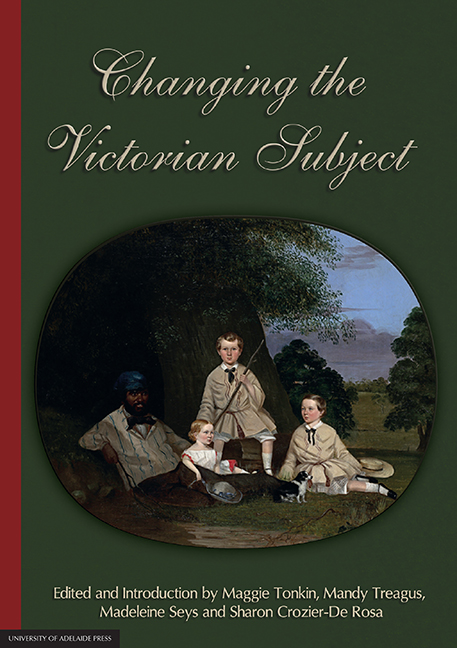Book contents
- Frontmatter
- Contents
- Notes on Contributors
- 1 Re-visiting the Victorian subject
- 2 Queen Victoria's Aboriginal subjects: a late colonial Australian case study
- 3 Identifying with the frontier: Federation New Woman, Nation and Empire
- 4 A ‘Tigress’ in the Paradise of Dissent: Kooroona critiques the foundational colonial story
- 5 The making of Barbara Baynton
- 6 A literary fortune
- 7 Olive Schreiner's From Man to Man and ‘the copy within’
- 8 Guy Boothby's ‘Bid for Fortune’: constructing an Anglo-Australian colonial identity for the fin-de-siècle London literary marketplace
- 9 The scenery and dresses of her dreams: reading and reflecting (on) the Victorian heroine in M.E. Braddon's The Doctor's Wife
- 10 The woman artist and narrative ends in late-Victorian writing
- 11 Miss Wade's torment: the perverse construction of same-sex desire in Little Dorrit
- 12 ‘All the world is blind’: unveiling same-sex desire in the poetry of Amy Levy
- 13 From ‘Peter Panic’ to proto-Modernism: the case of J.M. Barrie
6 - A literary fortune
Published online by Cambridge University Press: 05 December 2014
- Frontmatter
- Contents
- Notes on Contributors
- 1 Re-visiting the Victorian subject
- 2 Queen Victoria's Aboriginal subjects: a late colonial Australian case study
- 3 Identifying with the frontier: Federation New Woman, Nation and Empire
- 4 A ‘Tigress’ in the Paradise of Dissent: Kooroona critiques the foundational colonial story
- 5 The making of Barbara Baynton
- 6 A literary fortune
- 7 Olive Schreiner's From Man to Man and ‘the copy within’
- 8 Guy Boothby's ‘Bid for Fortune’: constructing an Anglo-Australian colonial identity for the fin-de-siècle London literary marketplace
- 9 The scenery and dresses of her dreams: reading and reflecting (on) the Victorian heroine in M.E. Braddon's The Doctor's Wife
- 10 The woman artist and narrative ends in late-Victorian writing
- 11 Miss Wade's torment: the perverse construction of same-sex desire in Little Dorrit
- 12 ‘All the world is blind’: unveiling same-sex desire in the poetry of Amy Levy
- 13 From ‘Peter Panic’ to proto-Modernism: the case of J.M. Barrie
Summary
Mary Fortune wrote for the popular literary miscellany the Australian Journal, which began publication in Melbourne in 1865. It was a cheeky copy of the English publication the London Journal and Fortune was its most enduring writer. She wrote urban ethnography, romance, autobiography, Gothic serial fiction, poetry, an occasional recipe and detective fiction. Not only did she contribute (almost without interruption) for over 40 years but her work encompassed a range of genres and explored the burgeoning modern metropolis of Melbourne, the turbulence of the goldfields and the ‘bush’.
Fortune's work provides an unparalleled literary and historical perspective on a changing colonial landscape because of her longevity as a contributor. Her ability to adapt and change her writing style was extraordinary. It is best illustrated by her contributions published between 1865 and 1885, which coincided with the most tumultuous period of the Australian Journal. Not only did she often change the subject within her stories to soften the impact of her incisive critiques of colonial society, but reading her work also changes our perspective on the subject of colonial women. Fortune's very candid reflections on the day-to-day problems faced by immigrant women in the colonies changes the subject and the perspective from the more common male version to the female one and provides an alternative version of colonial experience.
- Type
- Chapter
- Information
- Changing the Victorian Subject , pp. 105 - 122Publisher: The University of Adelaide PressPrint publication year: 2014



